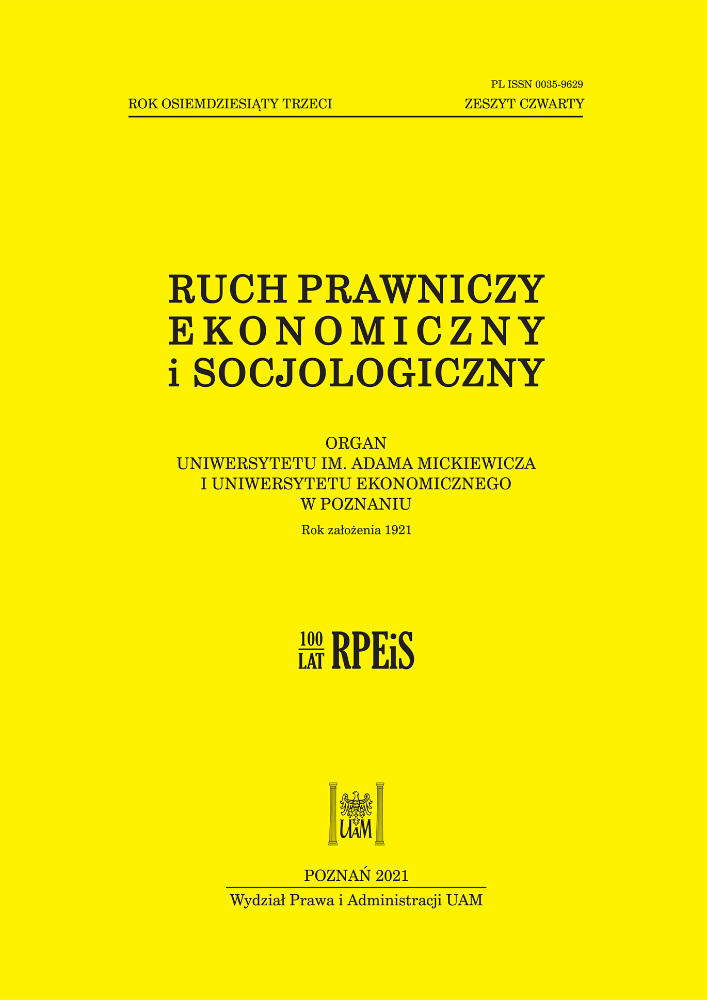Abstract
The article analyses the practical functioning of a complaint against excessive length of proceedings before the Polish Supreme Administrative Court. The author analysed the case law of the Supreme Administrative Court in this regard in 2015–2019 as well as statistics relating to complaints and the duration of proceedings before the Court. This analysis leads to the conclusion that such complaints are an ineffective means of protecting the infringed right to be heard within a reasonable time, which is provided for in Article 6 of the European Convention on Human Rights. The problem of long-lasting proceedings before the Supreme Administrative Court is of a systemic and structural nature, and is primarily related to the insufficient number of judges and clerks at the Supreme Administrative Court. The argumentation presented in the stabilized jurisprudence of the Supreme Administrative Court – which dismisses complaints and refers both to the fact that a given case is awaiting examination in the order of the receipt of cases by the Supreme Administrative Court and to the large number of cassation complaints submitted to this court – is not justified in the light of the standards resulting from the jurisprudence of the ECtHR. This is because such arguments lead to the consequences of the organizational and financial shortcomings of the judiciary being transferred to the individual.
References
Hofmański, P., Wróbel, A. (2010). Komentarz do art. 6 EKPC, [w:] L. Garlicki (red.), Konwencja o ochronie praw człowieka i podstawowych wolności. Tom: 1: Komentarz do artykułów 1–18. Warszawa: 241–461.
Brzozowski, W., Krzywoń, A., Wiącek, M. (2018). Prawa człowieka. Warszawa.
Celińska-Grzegorczyk, K. (2018). Odpowiedzialność odszkodowawcza za naruszenie prawa strony do rozpatrzenia sprawy bez nieuzasadnionej zwłoki w postępowaniu sądowoadministracyjnym po nowelizacji z 30 listopada 2016 r. Zeszyty Naukowe Sądownictwa Administracyjnego 2(77): 53–63.
Garlicki, L. (2008). Pojęcie i cechy „sądu” w świetle orzecznictwa Europejskiej Konwencji Praw Człowieka, [w:] A. Szmyt (red.), Trzecia władza. Sądy i Trybunały w Polsce. Gdańsk: 140–160.
Kładoczny, P., Pietryka, A., Bernatt, M., Grabowska, B. (2010). Skarga na przewlekłość postępowania. Warszawa.
Kłak, C.P. (2008). Pojęcie przewlekłości postępowania sądowego. Prokuratura i Prawo 12: 63–80.
Krakowiak, M. (2007). Charakter prawny skargi o stwierdzenie przewlekłości postępowania cywilnego. Monitor Prawniczy 15: 834–850.
Nowicki, M.A. (2013). Wokół Konw encji Europejskiej. Komentarz do Europejskiej Konwencji Praw Człowieka. Warszawa.
Pietryka, A. (2015). Przewlekłość jako problem strukturalny w Polsce – analiza wyroku Rutkowski i Inni przeciwko Polsce. Helsińska Fundacja Praw Człowieka. <https://www.hfhr.pl/wp-content/uploads/2016/02/HFPC_analizy_I_rekomendacje_92015_ost2.pdf> [dostęp: 23.11.2020].
Ryms, W. (2010). Skarga na przewlekłość postępowania przed sądami administracyjnymi. Zeszyty Naukowe Sądownictwa Administracyjnego 5/6: 374–385.
Stefanicki, R. (2016). Skarga na przewlekłość postępowania sądowego z perspektywy standardów konstytucyjnego prawa do sądu. Przegląd Sejmowy 3: 45–60.
Vitkauskas, D., Dikov, G. (2012). Ochrona prawa do rzetelnego procesu w Europejskiej Konwencji o Ochronie Praw Człowieka. Strasbourg. <https://rm.coe.int/16806f1615> [dostęp: 23.11.2020].
License
Copyright (c) 2021 WPiA UAM

This work is licensed under a Creative Commons Attribution-NonCommercial-NoDerivatives 4.0 International License.





